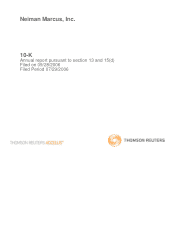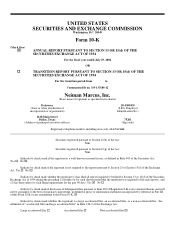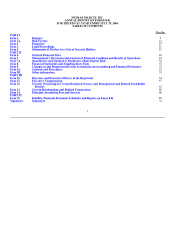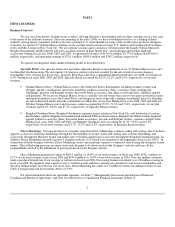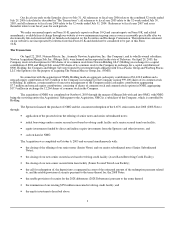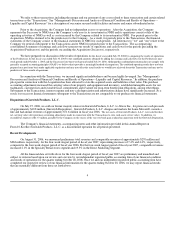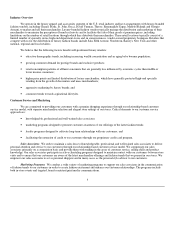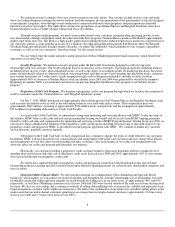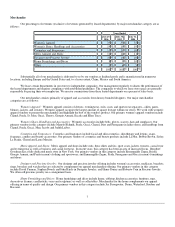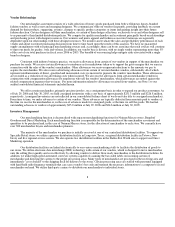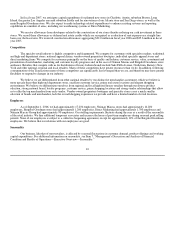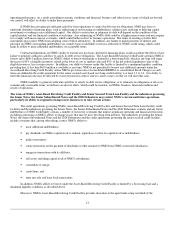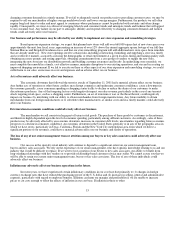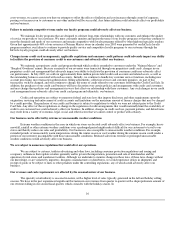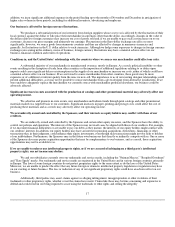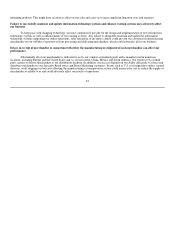Neiman Marcus 2005 Annual Report Download - page 11
Download and view the complete annual report
Please find page 11 of the 2005 Neiman Marcus annual report below. You can navigate through the pages in the report by either clicking on the pages listed below, or by using the keyword search tool below to find specific information within the annual report.
Vendor Relationships
Our merchandise assortment consists of a wide selection of luxury goods purchased from both well-known luxury-branded
fashion vendors as well as new and emerging designers. We communicate with our vendors frequently, providing feedback on current
demand for their products, suggesting, at times, changes to specific product categories or items and gaining insight into their future
fashion direction. Certain designers sell their merchandise, or certain of their design collections, exclusively to us and other designers sell
to us pursuant to their limited distribution policies. We compete for quality merchandise and assortment principally based on relationships
and purchasing power with designer resources. Our women's and men's apparel and fashion accessories businesses are especially
dependent upon our relationships with these designer resources. We monitor and evaluate the sales and profitability performance of each
vendor and adjust our future purchasing decisions from time to time based upon the results of this analysis. We have no guaranteed
supply arrangements with our principal merchandising sources and, accordingly, there can be no assurance that such sources will continue
to meet our needs for quality, style and volume. In addition, our vendor base is diverse, with no single vendor representing more than 5%
of the cost of our total purchases in fiscal years 2006 or 2005. The breadth of our sourcing helps mitigate risks associated with a single
brand or designer.
Consistent with industry business practice, we receive allowances from certain of our vendors in support of the merchandise we
purchase for resale. We receive certain allowances to reimburse us for markdowns taken or to support the gross margins that we earn in
connection with the sales of the vendor's merchandise. Other allowances we receive represent reductions to the amounts we pay to
acquire the merchandise. We also receive advertising allowances from certain of our merchandise vendors, substantially all of which
represent reimbursements of direct, specified and incremental costs we incurred to promote the vendors' merchandise. These allowances
are recorded as a reduction of our advertising costs when incurred. We also receive allowances from certain merchandise vendors in
conjunction with compensation allowances for employees who sell the vendors' merchandise, which allowances are netted against the
related compensation expenses that we incur. For more information related to allowances received from vendors, see Note 1 to our
audited consolidated financial statements included herein.
We offer certain merchandise, primarily precious jewelry, on a consignment basis in order to expand our product assortment. As
of July 29, 2006 and July 30, 2005, we held consigned inventories with a cost basis of approximately $251.3 million and $226.8 million,
respectively, (consigned inventories are not reflected in our consolidated balance sheet as we do not take title to consigned merchandise).
From time to time, we make advances to certain of our vendors. These advances are typically deducted from amounts paid to vendors at
the time we receive the merchandise or, in the case of advances made for consigned goods, at the time we sell the goods. We had net
outstanding advances to vendors of approximately $25.0 million at July 29, 2006 and $24.6 million at July 30, 2005.
Inventory Management
Our merchandising function is decentralized with separate merchandising functions for Neiman Marcus stores, Bergdorf
Goodman and Direct Marketing. Each merchandising function is responsible for the determination of the merchandise assortment and
quantities to be purchased and, in the case of Neiman Marcus stores, for the allocation of merchandise to each store. We currently have
over 300 merchandise buyers and merchandise planners.
The majority of the merchandise we purchase is initially received at one of our centralized distribution facilities. To support our
Specialty Retail stores, we utilize a primary distribution facility in Longview, Texas, a regional distribution facility in Totowa, New
Jersey and five regional service centers. We also operate two distribution facilities in the Dallas-Fort Worth area to support our Direct
Marketing operation.
Our distribution facilities are linked electronically to our various merchandising staffs to facilitate the distribution of goods to
our stores. We utilize electronic data interchange (EDI) technology with certain of our vendors, which is designed to move merchandise
onto the selling floor quickly and cost-effectively by allowing vendors to deliver floor-ready merchandise to the distribution facilities. In
addition, we utilize high-speed automated conveyor systems capable of scanning the bar coded labels on incoming cartons of
merchandise and directing the cartons to the proper processing areas. Many types of merchandise are processed in the receiving area and
immediately "cross docked" to the shipping dock for delivery to the stores. Certain processing areas are staffed with personnel equipped
with hand-held radio frequency terminals that can scan a vendor's bar code and transmit the necessary information to a computer to record
merchandise on hand. We utilize third-party carriers to distribute our merchandise to individual stores.
8

